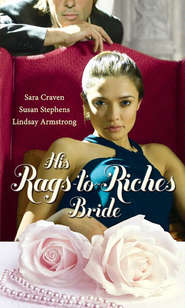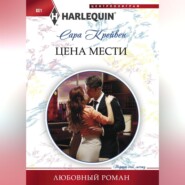По всем вопросам обращайтесь на: info@litportal.ru
(©) 2003-2024.
✖
Dark Ransom
Автор
Год написания книги
2018
Настройки чтения
Размер шрифта
Высота строк
Поля
‘You surely aren’t serious.’ Her mother’s face had been totally outraged. ‘What on earth will you do—miles from civilisation like that?’
Be on my own for once, Charlie had thought fiercely. Enjoy a few weeks of independence.
But she hadn’t said so aloud. Like so many selfish and demanding people, her mother had feelings all too easily wounded, and any such remark from Charlie would have been met with days of sulks and pointed remarks. She’d learned to her cost and long ago that it simply wasn’t worth it.
Instead she’d said quietly, ‘It’s always been an ambition of mine.’
‘What curious ambitions you do have,’ Sonia had drawled, putting down her coffee-cup. ‘One minute you’re skivvying for a pack of ungrateful old biddies. The next you’re vanishing up the Amazon. What will the local geriatric brigade do without you?’
‘Oh, don’t even talk about it,’ Mrs Graham said pettishly. ‘It’s enough disgrace having a daughter in domestic service, without allowing it to become a topic of conversation in my own sitting-room.’
‘I’m a home help,’ Charlie said patiently. ‘And I happen to like my old ladies very much.’
Sonia gave a silvery laugh. ‘Well, you have every reason to adore the late Mrs Hughes, leaving you that weird legacy to be spent on foreign travel. Although I bet she didn’t have the Amazon in mind. She probably expected you’d do a guided educational tour round the European capitals and meet some suitable man.’ She gave her sister’s slight figure a disparaging look. ‘But then, of course, she didn’t really know you very well, did she?’
‘Perhaps not,’ Charlie agreed colourlessly. She wondered if by ‘suitable’ Sonia was thinking of someone like her own husband. In Charlie’s view, Gordon was a smug, self-opinionated bore, smart and sleek on the surface, but already running to fat in his designer suits like an over-stuffed sofa. But as Sonia and their mother were totally complacent about the marriage, Charlie kept her opinions carefully to herself.
‘So, cleaning all that silver and listening to her endless ramblings paid dividends in the end.’ Sonia lit a cigarette. ‘Really quite clever of you, sweetie.’
Charlie boiled inwardly, and silently. It hadn’t been clever at all. Mrs Hughes had seemed to enjoy her visits, and they’d struck up quite a friendship in the relatively short time available, but that was all there was to it. Charlie had been genuinely grieved when Mrs Hughes had succumbed to a final heart attack, and the subsequent letter from a solicitor informing her of her bequest had left her stunned.
Apart from anything else, Mrs Hughes had lived very modestly. There’d been nothing to suggest she’d had that sort of money at her disposal.
‘To my dear young friend Charlotte Graham, so that she may spread her wings abroad at last,’ the codicil had stated.
‘I can’t accept it,’ Charlie had said at first, and the solicitor, Mr Beckwith, had smiled understandingly.
‘You won’t be depriving some deserving relative, my dear young lady. Far from it,’ he commented with a certain dryness. ‘The rest of the estate goes to Mrs Hughes’s nephew Philip, and he, unfortunately, has not been in contact with his aunt for several years. In fact, it isn’t certain where he is, or even if he’s still alive.’ He sighed. ‘Rather a self-willed, adventurous young man, I understand.’
‘Mrs Hughes thought he was still alive,’ Charlie said. ‘She was convinced of it. She talked about him a lot—said he’d gone to South America to prospect for gold, swearing he’d come back a millionaire.’
Mr Beckwith tutted. ‘A very risky undertaking, and a great grief to his aunt. We shall advertise, of course, but he could be anywhere. South America—so vast.’
In the days that had followed Charlie had found herself thinking more and more about the missing Philip Hughes.
‘We quarrelled,’ Mrs Hughes had told her sadly. ‘I wanted him to continue training for his late father’s profession—so worthwhile—and he wanted to see the world. Neither of us was prepared to compromise.’ She sighed. ‘I, at least, know better now. He wrote a few times from Paraguay, and then from Brazil, but for the last two years—nothing.’
She’d shown Charlie a photograph. Philip Hughes was tall and fair, staring self-consciously at the camera, an arm draped across his aunt’s shoulders. There was nothing in his conventional good looks to suggest that underneath there was a wild adventurer yearning for escape.
But then, no one would think that of me either, Charlie thought with a faint grin. Especially when I’m still living at home at twenty-two.
She’d made several attempts to strike out on her own and find a bed-sitter, but each time her mother had reacted with tears and hysterical outbursts about neglect and ingratitude.
Charlie had always hated scenes, and raised, angry voices made her feel physically sick. But some inner voice told her she had to weather the storm about her holiday, or she would never have any personal freedom again.
And when she returned to England, she reasoned, the break would have been made, and she could start, in earnest, to plan a life for herself.
Her grin widened as she imagined her mother’s reaction to the fact that Charlie had bought her own hammock and cutlery in Belém for this trip. Mrs Graham, when she went abroad, insisted on every creature comfort known to the mind of man, and then some.
Charlie, on the other hand, intended to travel on the Manoela as far as the boat went, and decide what to do next when she got there.
It was odd, she thought, that all her mother’s objections to the trip had been rooted in the personal inconvenience to herself. She’d never once referred to the dangers her younger daughter might encounter en route in this alien world.
‘Probably thinks I’m too dull to worry about,’ Charlie told herself philosophically, and, compared with Sonia, for example, she undoubtedly was. Her sister had been the high flier where looks were concerned, and Charlie had existed in her shadow, learning not to resent the astonishment in people’s faces when they realised she and Sonia were related.
Now it was wonderful just to be alone, and at no one’s beck and call. To be able to stand at this rail, and watch the jungle world of the Amazon passing slowly in front of her.
And somewhere in the depths of all that greenery, on the banks of some hidden tributary, Philip Hughes might be panning for gold.
Now that she was actually here she could admit openly to herself that the idea of finding him had crossed her mind more than once. It might be a stupid romantic dream, but she had the last place-name Mrs Hughes had mentioned firmly fixed in her head. And if by some remote chance she found herself in the vicinity of Laragosa it would do no harm to make some enquiries.
Captain Gomez and some of the crew spoke a smattering of English, but they’d stared in total incomprehension at her hesitant questions.
But that hadn’t deterred her, and she planned to make some further enquiries when she went ashore at Mariasanta—and deliver that letter at the same time.
She shook her bobbed hair, smooth and shining as a shower of spring rain, back from her face.
Life might have been something of a non-event so far, but all that was going to change now—and this trip to Brazil was only the start.
Laragosa—here I come, she thought with a swift stab of excitement.
Her first glimpse of Mariasanta two days later damped her optimism a little. There was a wooden dock, built on piles, and flanked by the usual leaf-thatched Amerindian houses, rising on stilts out of the water. Behind these was a huddle of buildings with corrugated-iron roofs, and beyond them—the rain forest.
Charlie found herself wondering if there would actually be a hotel at all.
She’d had no further contact with Fay Preston, who’d left the boat at yesterday’s fuel stop without even the courtesy of a goodbye.
Before Charlie went ashore she took the usual precaution of stowing her passport and few valuables in her shoulder-bag, along with her mug and cutlery, as these items, she’d been warned, might disappear if left on the boat.
As it turned out, finding the hotel was no problem. It was a small wooden building with a sign, faded to illegibility, hanging over the front entrance, and a small veranda, which, like the paintwork, had seen better days. Charlie mounted the rickety steps with care, and went in.
The fan, affixed to the ceiling, kept the heavy, humid air moving, but did nothing to lower the temperature, she thought, wiping her face with a handkerchief as she looked round. She seemed to be in the bar, but the place was deserted. Charlie went over and rapped smartly on the unpolished wooden counter. There was a pause, then a small, fat man in a sleeveless vest and baggy trousers pushed his way through a beaded curtain behind the bar and stood looking at her in silently amazed enquiry.
Charlie said stiltedly, ‘Bom dia, senhor. Faia inglês?’
‘Não.’
Well, she supposed it had been too much to hope for, she thought resignedly as she delved for her phrase book.
She produced the letter. ‘Tenho uma carta.’ She’d looked that up already. And also how to ask if the recipient was in residence. ‘O Senhor da Santana mora aqui?’
The man’s bemused expression deepened, and the shake of his head was a decided negative, but he took the letter from her, first wiping his hand on his trousers, and examined it as if it might bite him.
Charlie was almost relieved that the unknown Senhor da Santana didn’t live at the hotel after all. She hadn’t relished the prospect of trying to explain in her minimal Portuguese that Fay Preston had chickened out on his family’s hospitality. But then Ms Preston hadn’t seemed exactly a linguist either, so perhaps the senhor spoke a modicum of English.
She shrugged mentally. Well, she’d done all that she’d been asked, and now she could see something of the town before the Manoela sailed. It was clearly no use in pursuing any enquiries about Laragosa with the hotel proprietor, but tracing Philip Hughes had only been a silly dream anyway.
She realised the man was gesturing at her, pantomiming a drink, and she hesitated. Judging by what she’d seen on the way, this was the only bar in town, she thought, touching her dry lips with the tip of her tongue, so she might as well take advantage of it, unprepossessing though it was.













